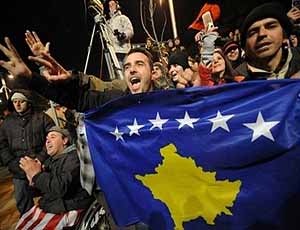February 21, 2008 (the date of publication in Russian)
Maxim Kalashnikov
THE CHALLENGE OF KOSOVO
How should Russia respond to the slap on its face?
 The leading nations of Europe, as well as the United States, have recognized independence, unilaterally declared on February 17 by Kosovo, a breakaway autonomy of Serbia. Thus, Moscow has repeatedly encountered demonstrative disregard of its viewpoint on crucial issues of global policy. Should Russia eat dirt, or respond to this challenge?
The leading nations of Europe, as well as the United States, have recognized independence, unilaterally declared on February 17 by Kosovo, a breakaway autonomy of Serbia. Thus, Moscow has repeatedly encountered demonstrative disregard of its viewpoint on crucial issues of global policy. Should Russia eat dirt, or respond to this challenge?
Facing this choice, Russia should find out whether the official Serbia is committed to strive for the alienated land that comprises an indispensable part of its cultural and religious identity. Though openly displaying dissent, Boris Tadic's administration is unlikely to confront the Kosovars as that is equal to confrontation with NATO. Moreover, this administration will hardly support the guerilla groups of the Serbian minority in Kosovo, as well as the multiplying paramilitary units. These groups will be most probably left derelict and undergo manhunt from the machine of NATO's police forces.
The recent elections have demonstrated that the Serbian nation is divided into nationalists and supporters of the country's integration in the EU. Even in the period of the 1992-1995 war, when Serbian troops were involved in battles in Croatia and Bosnia, many citizens of Belgrade did not bother to assist their native people in Bosnia, bitterly disappointing those Russians who then came to the rescue. Similarly, Slobodan Milosevic, described in Western press as a political hardliner and dictator, caved in to NATO in 1999, though at that time it was yet possible to prevent the secession of Kosovo.
The massive unrest in Serbia may force the newly-reelected Boris Tadic to resign. The outcome of this option is unclear by now. The probability that Belgrade would de facto countenance the loss of Kosovo is still high.
What is Russia going to do? In the present political situation, the Russian Federation will hardly take a risk of getting involved in the armed conflict. Even in case of a commitment on the supreme level of power, Russia is today too exposed to the effect of possible economic sanctions. The Russian Federation is much more dependent on European deliveries of food, equipment and machinery parts than Europe is dependent on Russian gas. Termination of imports from EU countries implies devastating consequences.
In case the desperate Kosovo Serbs initiate a guerilla war, the only form of support the official Moscow could allow itself is not to prevent Russian volunteers from traveling to the battlefield, since Russia officially recognizes Serbia's unity.
Still, some kind of response is necessary, as Russia is actually being told: "You are a non-entity, and we let you go whistle". Moscow could respond to this slap on the face by diplomatic means – for instance, by official recognition of Transdniester, South Ossetia, and Abkhazia. Western nations are unlikely to respond with nuclear warfare. Besides, the official Russia has already admitted the possibility of this symmetric response, and the word is to be kept. At least, Russia should withdraw from the Istanbul agreements of 1999.
In the period of the Moscow Tsardom and the early Russian Empire, the Russians were equally unable to launch a liberation war to rescue the fraternal Orthodox people from the Ottoman oppression. Still, refugees from Serbia were then allowed to settle in Russia and to integrate in the Russian nation. Today's Russia also has a possibility to shelter the fugitive Serbs and provide them material assistance. However, similar aid should be provided to the Russians, arriving from Central Asia. This effort requires a breakthrough increase of construction in rural areas, massively abandoned since 1991. Why not launch a special state program for this purpose?
The most adequate response to the present geopolitical slap on the face should express itself in promptest modernization of Russia as an innovative, high technologies-based great power, run by a new patriotic and innovative elite that is to replace today's raw export-profiteering, comprador establishment. Such a transformed, speedily developing Russia will have to be reckoned with.
Number of shows: 1056
 ENG
ENG 

 ENG
ENG 
